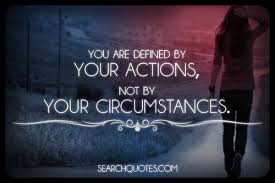by James Burns | Feb 20, 2018 | Bully Proof Classroom, James Burns, Responsible Actions

Actions do speak louder than words, for sure, if you follow the pattern, thoughts lead to words and words translate into action. That is unless, of course, you are a bag of wind and never follow through on anything you say. Kids, though, get placed on the battlefield of the bully/victim dynamic through their words, and get pressured into taking action. Of course, this all starts in their thoughts. The more that gets said, the more action has to be taken. Most of the time, these actions are taken out of impulse, leading to serious problems among bullies, victims, and other students who they are friends with, creating discipline problems for teachers, administration, and the school’s bullying specialist. Always keep your hand on the pulse of your classroom, and your school, and listen for threatening words that you know could lead to a bullying event. At this point, the child’s or teen’s thoughts have escaped the confines of his secret life and have now become public. STOP HIM NOW, before you have a bigger problem to deal with.
Visit My Store
by James Burns | Feb 17, 2018 | Anti Bullying Tips, Bully Proof Classroom, Gossiping, James Burns

Complaining about students in the faculty room does nothing to support the educational environment. Once you find other teachers who enjoy complaining about students, it becomes much easier to get into a routine of complaining to each other. This then makes it easier for other teachers to join right in. What usually goes along with this is a great deal of talk about how the student’s lack of achievement or bullying and behavioral problems in the classroom are caused by outside circumstances such as family or the child’s intergenerational tendencies (e.g. “I had his father as a student and I am not surprised. He is just like him”). The problem is that you take the focus off of yourself and the things you can do to be part of the solution. Plus, if you’re badmouthing your students, and other teachers are feeding right into it, you will walk back into your classroom with a greater dislike and additional reasons for having a negative attitude toward those students.
by James Burns | Feb 14, 2018 | Bully Proof Classroom, Bullying, James Burns, Root Problems, Uncategorized
 Often, we observe behaviors in children and begin to label them as “lazy,” “unmotivated,” and “stubborn.” What we are observing are really only the symptoms of what is actually going on within the hearts and minds of our students. When we treat the symptoms with systemic consequences, we never really get to the root problem. Don’t get me wrong; bullies need consequences, but a balance needs to be struck between rules and regulations, compassion and understanding. Bullies need to be disciplined, but consequences alone won’t stop the bullying. As an example, we label kids as “lazy” all the time. In reality, laziness is really the manifestation of disrespect. It’s not that the kid won’t do things; he/she just won’t do them for you because of a poor relationship that has developed over time. Often, therapy is necessary to peek into the mind of this kid. But, if we take the time to form a relationship with the bully and stop dealing with the symptoms, we will be providing this kid with permanent help, not temporary relief, and will be setting him/ her on the path to lifelong success.
Often, we observe behaviors in children and begin to label them as “lazy,” “unmotivated,” and “stubborn.” What we are observing are really only the symptoms of what is actually going on within the hearts and minds of our students. When we treat the symptoms with systemic consequences, we never really get to the root problem. Don’t get me wrong; bullies need consequences, but a balance needs to be struck between rules and regulations, compassion and understanding. Bullies need to be disciplined, but consequences alone won’t stop the bullying. As an example, we label kids as “lazy” all the time. In reality, laziness is really the manifestation of disrespect. It’s not that the kid won’t do things; he/she just won’t do them for you because of a poor relationship that has developed over time. Often, therapy is necessary to peek into the mind of this kid. But, if we take the time to form a relationship with the bully and stop dealing with the symptoms, we will be providing this kid with permanent help, not temporary relief, and will be setting him/ her on the path to lifelong success.
by James Burns | Feb 12, 2018 | Bully Proof Classroom, James Burns, Relationships, Uncategorized

As our students move forward in life, their desire to have meaningful relationships with the opposite sex intensifies and dating becomes a real novelty. Discussions in high school, and even middle schools, are continually taking place about who is seeing whom, and who likes whom. Even people who are older and have been away from the dating seen for a while find this type of situation awkward, and at times, uncomfortable. Just take a look at two people who are in the initial stages of building a relationship. He/she seems to be the greatest. Get to know them, I mean really know them, and what they are really about. Get on the inside track, and the indecisiveness of whether or not to stay will cause such fear, that arguments will be more common than holding hands. Young daters, and by young I mean high school age ,are more prone to being harassed and intimidated in a relationship then ever before. They enter in and really don’t know how to get out. And, often when they try to get out, they are harassed with rumors and gossip flooding the school building, destroying a person’s reputation. What do people fear the most? Sadly, people fear each other, and the closer they get to someone, the more they fear them. At the high school level our students need to be taught the ins and outs of dating. But, more emphasis needs to be placed on reading someone’s motives and knowing how to make a graceful exit when necessary. Teenagers stay in abusive relationships for many reasons; low self-esteem is one of them. Teach your students that they have a choice and to stay firm when they decide to either stay in or get out. The divorce rate is already too high.
by James Burns | Feb 11, 2018 | Behavior Management, Bully Proof Classroom, James Burns, The Bully Proof Classroom

“It doesn’t mean that much to me to mean that much to you.” Neil Young sang this verse in his song “Old Man.” Significant others. We all have them, and we all have had them: those that have impacted our life in such a way that we can still hear their voice calling us long after they have passed on. My dad was very significant in my life. He was hypercritical, I always sought his approval—it was tough to get. Sometimes I just wanted to give up. I mean, what’s the use in trying? I thought, “Can’t please the old man no matter what I do.” The story is too long to tell here, but after he attended one of my baseball games and saw, I mean really saw the type of baseball player I was, he told me that he was so proud of me and hugged me. I don’t think he had a clue as to what that meant to me. I forgot all the past criticism and have hung on to those words to this day. He probably changed my life and didn’t even know it. Whether we want to believe it or not, as adults, we are significant to others right now. It’s time to realize how much we mean to our children, our spouses, and as educators, those we teach. How much does it really mean to you to mean that much to another person? It doesn’t matter what you have said or done in the past; a life can be changed with the right words at the right time. Often, we allow our past to dictate how we are going to treat others; don’t let it. The bullies and the victims of this world are crying out for significant others. Their parents may not be doing enough to fill the void in their hearts and souls. Come to terms today, and I mean right now, on what you really mean to others, and take the time to let them know how much they mean to you. If anyone would like the full story about my dad you can view the video by clicking the button below.

by James Burns | Feb 9, 2018 | Bully Proof Classroom, Bullying, Documentation, James Burns, Uncategorized
 Documentation
Documentation
Whether or not bullying is a problem in your classroom, you should keep anecdotal records of students’ behavior. If you have students who are or who might become potential bullies, anecdotal records are even more important. If a student has more than one teacher, each teacher should keep behavioral logs, and they should be compared from time-to-time. Why is this so important? When parent meetings are conducted, a parent will usually confront the anecdotals from one teacher, but if more than one teacher has similar anecdotal records, the information presented will be viewed more legitimately by the parent. Often, a parent will view a negative one-on-one conference with a teacher subjectively and believe that the teacher is picking on his/her kid or worse yet, that the teacher really doesn’t like his/her kid. As an aside, parent meetings should always be held with more than one teacher present. If that’s not possible, an administrator or guidance counselor should be present for support. Never try to go at it alone with the parent of a student who is a bully.



 Often, we observe behaviors in children and begin to label them as “lazy,” “unmotivated,” and “stubborn.” What we are observing are really only the symptoms of what is actually going on within the hearts and minds of our students. When we treat the symptoms with systemic consequences, we never really get to the root problem. Don’t get me wrong; bullies need consequences, but a balance needs to be struck between rules and regulations, compassion and understanding. Bullies need to be disciplined, but consequences alone won’t stop the bullying. As an example, we label kids as “lazy” all the time. In reality, laziness is really the manifestation of disrespect. It’s not that the kid won’t do things; he/she just won’t do them for you because of a poor relationship that has developed over time. Often, therapy is necessary to peek into the mind of this kid. But, if we take the time to form a relationship with the bully and stop dealing with the symptoms, we will be providing this kid with permanent help, not temporary relief, and will be setting him/ her on the path to lifelong success.
Often, we observe behaviors in children and begin to label them as “lazy,” “unmotivated,” and “stubborn.” What we are observing are really only the symptoms of what is actually going on within the hearts and minds of our students. When we treat the symptoms with systemic consequences, we never really get to the root problem. Don’t get me wrong; bullies need consequences, but a balance needs to be struck between rules and regulations, compassion and understanding. Bullies need to be disciplined, but consequences alone won’t stop the bullying. As an example, we label kids as “lazy” all the time. In reality, laziness is really the manifestation of disrespect. It’s not that the kid won’t do things; he/she just won’t do them for you because of a poor relationship that has developed over time. Often, therapy is necessary to peek into the mind of this kid. But, if we take the time to form a relationship with the bully and stop dealing with the symptoms, we will be providing this kid with permanent help, not temporary relief, and will be setting him/ her on the path to lifelong success.


 Documentation
Documentation



